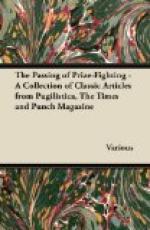Sir ROBERT HORNE explained with his usual clarity and persuasiveness the new Unemployment Insurance Bill. The debate on it was interrupted to allow the discussion of a motion by Sir J. REMNANT advocating the increase of police pensions to meet the present cost of living. The police are, with good reason, very popular with the House. In vain the HOME SECRETARY pointed out that the Government even in this cause did not feel justified in “out-running the constable.” Forgetting all their recent zeal for economy Members trooped into the Bobbies’ Lobby and beat the Government by 123 to 57.
[Illustration: “Whether a portrait is a work of art depends on the artist and not on the subject painted.”—Sir A. MOND on the Imperial War Museum Pictures.]
The idea that Irishmen, however much they may dislike British rule, never miss an opportunity of raiding the British Treasury, has received a rude shock. Captain REDMOND, inquiring about the allocation of a sum of a quarter-of-a-million for reconstruction in Ireland, was surprised to learn that ten thousand pounds had been allotted to his own constituency, but not claimed. Mr. DEVLIN supplied the key to the mystery: “The reason it was not asked for was because we did not know it was there.”
I learn from Who’s Who? that the recreations of Sir ALFRED MOND include “golf, motoring and all forms of sport.” It must have been with keen regret, therefore, that he felt himself compelled to refuse facilities for cricket in Hyde Park, owing to the risk to the public. Viscount CURZON asked if cricket was more dangerous than inflammatory speeches. But the FIRST COMMISSIONER, speaking no doubt from personal experience, expressed the view that there was considerably more danger from a cricket-ball.
The Opposition had rather bad luck on the Constantinople debate. If they had waited till Monday, as originally arranged, they could have trained their big gun from Paisley on to the Government entrenchments. Through insisting on the earliest possible date, they had to content themselves with the far lighter artillery of Sir DONALD MACLEAN. Much, however, was hoped from Lord ROBERT CECIL, who was believed to be heavily charged with high explosives. But before he could come into range up jumped Sir EDWARD CARSON, and in a few brief sentences pointed out that until the PRIME MINISTER had told them the grounds for the decision to leave the Turk his capital, and the conditions under which he was to stay there, the House was talking in the air. Members thereupon clamoured for the PRIME MINISTER, who accordingly had to make his defence when he had heard only half the indictment, and to expend most of the ammunition he had prepared for Lord ROBERT, including some remarkable specimens of the “deadly parallel,” before receiving his adversary’s fire.
That in turn rather upset Lord ROBERT’S plan of campaign, and he was not much more destructive than Sir DONALD MACLEAN had been. The House as a whole seemed satisfied that the Allies had done their best with a problem for which there is no perfect solution, and that there was at least a chance that the SULTAN would find the guns of an international fleet pointing at his palace windows a strong incentive to good behaviour.




